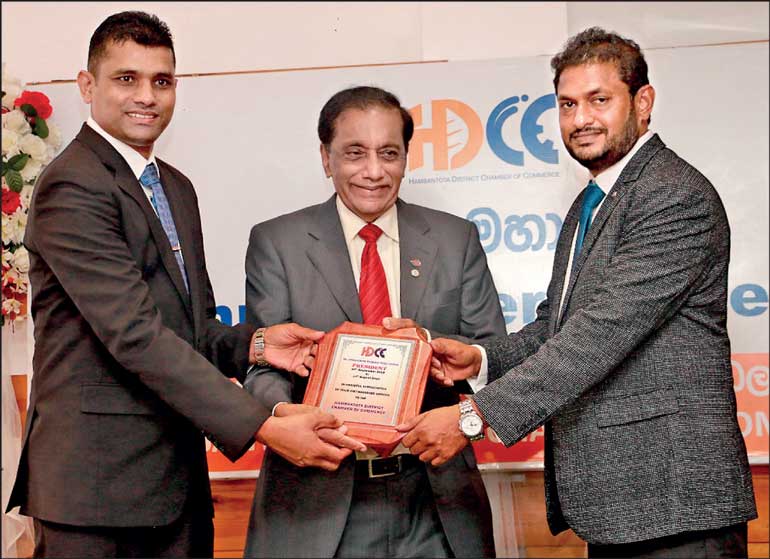Tuesday Feb 24, 2026
Tuesday Feb 24, 2026
Saturday, 27 August 2022 00:00 - - {{hitsCtrl.values.hits}}

COSMI President Nawaz Rajabdeen presenting the Plaque of Appreciation to HDCC outgoing President Chaminda Rusiru Maliyadda (left) along with HDCC President S.T. Muthumala
|
COSMI President Nawaz Rajabdeen making the keynote speech at the HDCC event following its AGM
|
Micro and small sector industries have been neglected for the past two decades and every successive government that came to power failed to contribute to the micro sector—although it is the largest employer in the country, and the backbone of the economy.
Regional and district chambers play an active role in supporting MSMEs across the country. In Sri Lanka more than 1.4 m micro and more than 500,000 are from the informal sector. Up to now, Sri Lanka doesn’t have an industrial policy in place. Neither do we have an industrial database of the micro and small sector in the country, which is fundamental in identifying the challenges and opportunities of the industrial sector in the country. As a result, every intervention made to support the industrial sector is isolated and disconnected with no coordinated approach nor overall vision.
Sri Lanka needs a sustainable industrial policy, whichever government that comes to power will have to follow—which will not change every five years, to accommodate a new government. Regional and district chambers need to play an important role in contributing and identifying issues and opportunities, and in communicating these to the government and the respective ministries to take appropriate action. Decisions that affect the whole nation need to be informed by evidence via a national industrial database and guided by a long-term national industrial policy. Drawing insight and identifying issues from the grassroots, and strategising new industries, new markets and linkages to value chains at the top level.
R&D is essential to technologically upgrade MSMEs
Sri Lanka lags in Research and Development to support existing and emerging industries, if we are to compete and survive in the future and improve contribution by industrial sector to the GDP. Sri Lankan MSMEs fall back decades in terms of technology adaptation. We are mediocre in our research and development expenditure (% of GDP) which was 0.13% in 2017. In 2017 Vietnam was 0.53% four times as Sri Lanka. Singapore was 1.92% in 2017—15 times as Sri Lanka. We have now learned the hard way —during COVID and the economic crises we are facing— that our economy is completely vulnerable to rely mostly on the service sector. Sri Lanka has enough resources and a highly literate workforce, and we need to optimise these resources to create more wealth, more employment, and more opportunities for the country.
Leveraging the new normal
As many experts have pointed out, we must capitalise on the new normal created by the COVID pandemic to build digital marketplaces and encourage women and youth, particularly in the regions, to take part in economic activities. We need to strategically reskill our workforce in specific industries that offer more benefit to the livelihoods of the communities and the national economy. For example, there is an enormous number of people in the low-income sector that work as three-wheel drivers. They could be sourced to farming and other small industries. Retail business can divest into cottage industries.
Educated stay at home mothers/women can become online entrepreneurs using social media and web platforms — as they have demonstrated during the COVID pandemic. School leavers can be trained to join the industrial workforce. Those who have lost jobs due to COVID and the economic crises could migrate to new industries and professions with the help of technical and vocational training through State institutions such as NAITA, ITI, VTA, etc., equipped with NVQ qualifications.
Inventors would also play a major role to support local industries, backed by the appropriate long-term financial instruments to support R&D and commercialise their inventions, helping propel Sri Lankan industries to propel into a higher orbit, building on niche markets. Many women demonstrated that they can win bread for their families during the COVID pandemic. New cottage industries sprung up overnight, social media platforms were packed with women selling, buying, and interacting online. They set a shining example to all of us.
MSME friendly financing and crisis support
But the most decisive factor is financial support. It is essential for MSMEs to survive the multiple challenges they face. Many MSMEs are struggling due to lack of working capital and financial support. During the COVID pandemic we saw that most MSMEs did not receive the benefits of moratoriums and financial aid extended by bilateral agencies to Sri Lankan MSMEs. The banks benefitted the most, while MSME industries remained high and dry. Central Bank—through its agency function in regional development—can play an important role in ensuring the MSMEs benefit from the support received. This would also help MSMEs by preventing them from becoming victims of informal money lenders.
For Sri Lankan MSME industries to reach their true potential, we need to consider all these aspects, including technology enhancement, access to finance, capacity development, market linkages, rural women and youth empowerment, entrepreneurship, among others. We also need champions to drive the cause of MSMEs in all these spheres, to ensure the voice of micro and small industries are heard persistently, loud and clear. That is the mission of COSMI. All regional chambers can work with COSMI to revive the industrial sector in Sri Lanka, to strengthen our economy via sustainable, inclusive industrial development.